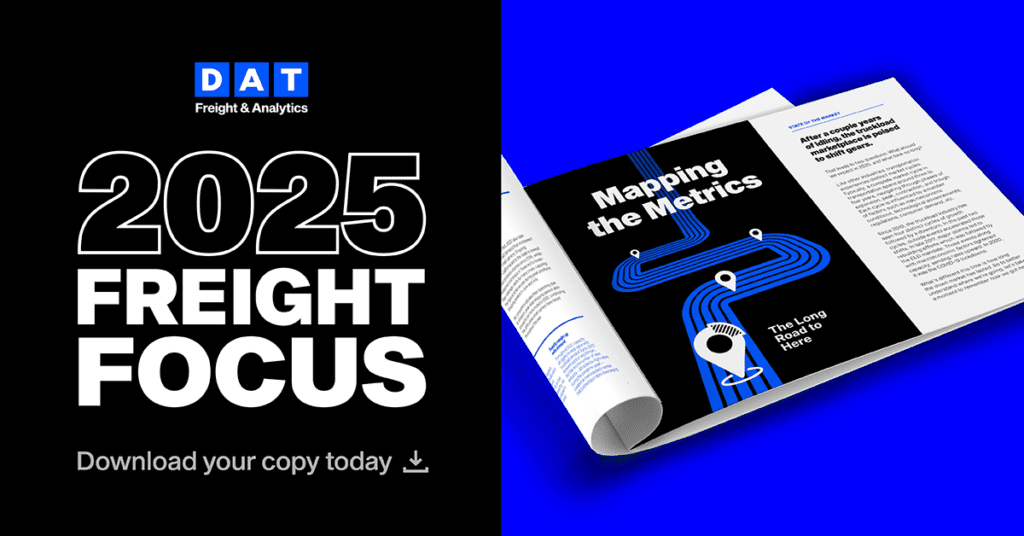Cardinal Health has adopted flexible two-year contracts to help maintain stability for carriers during a time of unprecedented uncertainty.
In response to the disruption and volatility of the market during the COVID-19 pandemic, flexibility has become crucial to survival for trucking companies. For many, that has meant updating their approach to technology and data, increasing transparency, and rethinking contracts and freight bids. Even companies that continue to rely on longer term contracts as opposed to the spot market or smaller, frequent freight bids have started to think about ways to make those arrangements more flexible.
Chris Caplice, Chief Scientist at DAT, spoke to Josh Dolan, Vice President of Global Logistics at Cardinal Healthcare, in a recent Freightvine podcast episode to learn what it’s like to manage transportation for a company with a wide portfolio of modes and channels during a time of uncertainty.

Dolan has worked at companies such as Amazon, Target, Dicks, Pep Boy and UPS, among others. He has extensive experience in the global transportation logistics space, particularly with sourcing, operations, first, middle, and final mile transportation, private fleet management, and business intelligence.
As a result, Dolan can offer unique insights into the specific benefits and challenges of different approaches to trucking contracts. He also shares the ways in which Cardinal Health’s approach is transforming transportation procurement for the better in both the short and long term.
Navigating truckload contracts in times of volatility
There’s no denying that the COVID-19 pandemic has brought its fair share of challenges. As a healthcare company, Cardinal Health has felt a particular pressure to ensure that they are delivering products to their customers in an effective and timely manner, especially given the life-changing impact those goods can have.
Fortunately, Josh Dolan and the rest of the Global Logistics team appreciate the importance of navigating these challenges. As Dolan explains, “Especially with COVID, the ability to impact people’s lives in a positive way — our customers, the doctors, and the hospitals that we serve and the patients they serve — the fact that we’re a part of that ecosystem, and we’re helping to make things better at this time in our history, is pretty significant.”
Of course, this doesn’t make the work any less challenging. Luckily for the team at Cardinal Health, the past few years have seen important developments that have laid the groundwork for resilience during the COVID-19 pandemic. In particular, Cardinal Health spent the last couple of years reorganizing and pulling together all of the transportation functions that were previously spread across the different components of the business into a single logistics unit.
That unity has made it easier for Dolan and the rest of his team to work together to navigate the challenges of the pandemic, including trucking contract pricing and ensuring product delivery. In particular, it has helped the entire team stay on the same page when it comes to implementing technology and real-time market data — like the data available through DAT iQ — to change their approach to trucking contracts.
Focusing on flexibility and stability
For the logistics team at Cardinal Health, maintaining longer contracts is essential to creating strong relationships with carriers and ensuring that products get delivered on time. The problem is that creating firm long-term contracts when demand and volumes are constantly changing can be hard to do. That’s why Cardinal Health has adopted an approach that merges the benefits of longer contracts (such as two year programs instead of their previous annual contracts) with some of the benefits of more frequent, smaller freight bids.
When people hear about long contracts — especially during times of such market volatility — they tend to worry about the cost. After all, if you make a long-term commitment, you are not as likely to get the lowest possible price as you could if you used market rate data to help navigate a frequent mini freight bidding process.
For Dolan, that isn’t a concern for three main reasons. First, Cardinal Health finds that there are significant costs that accompany churning through carriers. By building stable, long-term relationships with carriers, Cardinal can avoid these unnecessary costs.
Second, Dolan believes that focusing on stability in contracts as opposed to getting the lowest price for transportation services can have significant long-term benefits. Ultimately, it helps ensure that carriers will be able to deliver high quality service and get their products to customers reliably, no matter what sudden shifts in demand and volume they might face.
Lastly, Cardinal Health has developed an approach that means their two-year contracts are flexible and can be adjusted based on market changes without needing to sacrifice the stability and relationship benefits of long-term contracts. This flexibility, which allows contract pricing to bend rather than break in the face of quickly rising or plummeting rates, is not a brand new idea, but one that has significantly grown in popularity during the pandemic.
The goal of flexible long-term contracts is to both provide stability and keep trucks moving. At the same time, these contracts mean carriers don’t have to worry about penalties if orders fall below forecasts or drivers aren’t available, given that details can be adjusted to meet the current circumstances on both sides.
To achieve a level of comfort and confidence for both Cardinal Health and their carriers, these contracts have a “check in” point that may allow them to adjust rates if there is a significant shift in the market. This mirrors the index-based models used by some other companies implementing flexible contracts. In those models, there are set checkpoints where rates can be discussed or adjusted based on a pricing index, like DAT iQ’s freight rate index.
Strengthening relationships through transparency and innovation
“You don’t want to be penny wise, pound foolish in these conversations with providers,” says Dolan. “When you’re entering into an agreement with a multi-year term, there has got to be a lot of transparency and trust, and you have to be aware of what’s happening within the market on both sides.”
That transparency and understanding of the market is essential to succeeding with long-term contracts. It allows both parties to make multi-year agreements that offer stability — with the understanding that each side will be open about what changes may need to be made to the contract.
Transparency for Cardinal Health means sharing information about the needs of the business, how things are changing as a whole, and what that’s going to mean from a volume perspective as the network evolves. The rest is being clear about what is happening within the market and how those changes are impacting the company and the current contract. That way, Cardinal can offer pricing transparency to their carriers.
Of course, to be able to share this information, it’s critical to have a full grasp of the market on both the supplier side and the carrier side. Dolan believes that understanding both sides of the market with the aid of rate databases, indices, and even real-time market data is essential to building trust with transportation providers. It allows for more nuanced discussions of contract adjustments and demonstrates a commitment to the carrier’s success.
Succeeding with Long-Term Trucking Contracts
The plain fact is that no one wants to end up with the short end of the stick when it comes to trucking contracts, especially in times of volatility. Long-term contracts, like the two-year programs used by Cardinal Health, can offer stability to both carriers and shippers. In these cases, to maintain their mutually beneficial relationship, each party has an incentive to make adjustments to the contracts that reasonably reflect market rates. To succeed, these contracts require trust, transparency, and accurate market data.
Dolan and the rest of the Global Logistics team at Cardinal Health have all three. As a result, the company has been able to navigate the many challenges of the COVID-19 pandemic successfully, delivering much-needed goods and doing their part to support the healthcare system during a time of unprecedented crisis.

